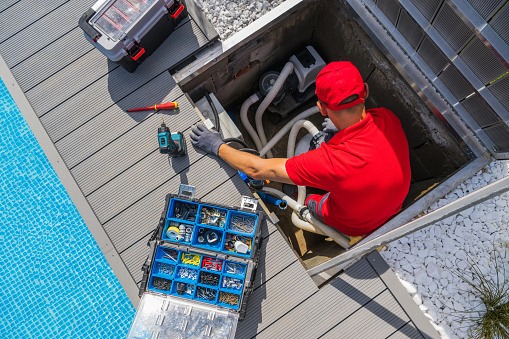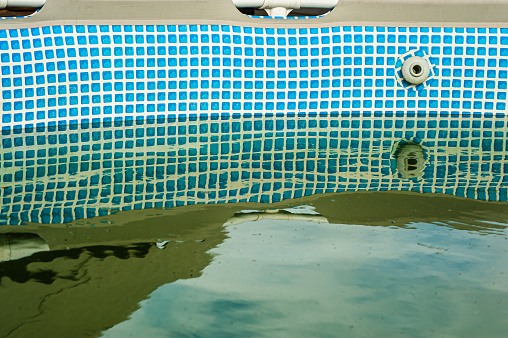Understanding Pool Filter Maintenance
Pool Filter Maintenance: Keep Your Water Crystal Clear
Maintaining a clean and inviting swimming pool is vital for health, safety, and overall enjoyment. At Pretty Pools, we understand the importance of keeping your pool water sparkling and safe. Located in Dallas, TX, our team specializes in professional pool filter maintenance to help you make the most of your backyard oasis.

Types of Pool Filters
Pool filters are the heart of your pool’s circulation system, working tirelessly to remove debris and impurities.
Sand Filters
- How They Work – Sand filters use a layer of specially graded sand to trap dirt and debris as water flows through.
- Advantages – Affordable, easy to operate, and long-lasting.
- Disadvantages – Less effective at filtering finer particles and require regular backwashing to maintain efficiency.
- Usage Tip – To improve the efficiency of sand filters, backwash them regularly and replace the sand every five years or as recommended by the manufacturer.
Cartridge Filters
- Functionality – Cartridge filters use pleated cartridges to capture particles. They’re highly efficient and offer a larger filtration surface.
- Pros – Minimal maintenance, higher filtration accuracy, and lower water waste compared to sand filters.
- Cons – Cartridges require periodic cleaning and eventual replacement, which can be more expensive than sand.
- Usage Tip – Cleaning your cartridges using a gentle stream of water helps to avoid damaging the pleats.
Diatomaceous Earth (DE) Filters
- Explanation – DE filters use a fine powder derived from fossilized algae to provide the highest level of filtration.
- Benefits – Exceptional clarity and efficiency in capturing microscopic particles.
- Challenges – Higher cost and more complex maintenance, such as replenishing DE powder after backwashing.
- Usage Tip – Regularly inspect DE grids for tears or wear, as damaged grids can reduce filtration efficiency.
Essential Pool Filter Maintenance Tasks
Keeping your pool filter in top condition is straightforward when you focus on these key pool maintenance tasks:
Regular Cleaning
Routine cleaning prevents buildup that can reduce efficiency. For sand filters, backwash regularly to flush out trapped debris. Cartridge filters should be rinsed with a hose every 2-6 weeks, and DE filters require a thorough backwash and powder replenishment.
- Pro Tip – Consider scheduling filter cleaning during periods of heavy use or after storms to handle increased debris load.
Checking and Replacing Filter Media
- When to Replace – Signs include cloudy water, reduced flow rate, or visible wear on filter media.
- How to Replace
-
- Turn off the pump and release pressure.
- Remove the old media (sand, cartridge, or DE powder).
- Clean the filter housing thoroughly.
- Add fresh media according to the manufacturer’s specifications.
- Best Practice – Always use high-quality replacement media to maintain optimal filtration.
Monitoring Pressure Levels
- Why It Matters – A pressure gauge helps you identify when the filter is underperforming. Rising pressure usually indicates a clog.
- Action Steps – Backwash or clean the filter when the pressure exceeds 10 psi above normal levels.
- Additional Tip – Keep an eye on the pressure gauge weekly to keep your filter operating efficiently.
Common Pool Filter Problems and Solutions
Even with proper maintenance, issues can arise. Here are some common problems and how to address them:
Clogged Filters
- Causes – Accumulated debris, algae growth, or neglected maintenance.
- Prevention Tips – Skim the pool regularly and schedule consistent filter cleaning.
- Solution – Backwash or rinse the filter and consider professional cleaning for severe clogs.
- Expert Tip – Using a pool cover can significantly reduce the debris load, minimizing filter clogs.
Leaks and Cracks
- Identification – Look for water pooling near the filter or visible cracks in the housing.
- Repair Options – Use epoxy or replace damaged parts. For significant damage, it’s best to consult a professional for pool filter repair.
- Advice – Regular inspections of the filter housing can help detect minor issues before they worsen.
Poor Water Quality

- Impact – A dirty or malfunctioning filter can produce cloudy or green water.
- Troubleshooting – Check for proper flow rates, clean or replace the filter media, and verify chemical balance.
- Extra Help – If water quality problems persist, consult a professional to evaluate your pool’s filtration system.
Benefits of Professional Maintenance
While regular DIY maintenance is essential, professional servicing can extend the lifespan of your pool filter and ensure it operates at peak performance. Our expert team at Pretty Pools provides:
- Comprehensive inspections to identify potential issues.
- Expert cleaning and media replacement services.
- Tailored maintenance plans to fit your pool’s specific needs.
Conclusion
Regular pool filter maintenance is essential for keeping your swimming pool water clean, clear, and safe. By understanding the types of filters and performing routine upkeep, you can avoid common issues and enjoy a hassle-free pool experience. When you need expert help, Pretty Pools in Dallas, TX, is here to provide reliable and professional pool maintenance services. Contact us today and get a free estimate, let us take the hassle out of pool care so you can focus on enjoying your time in the water.
